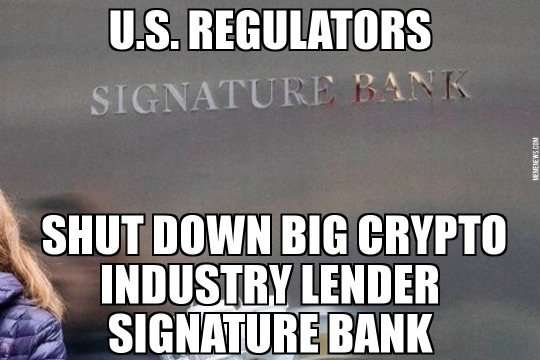#signature bank
Text

[link to tweet]
111 notes
·
View notes
Text
“Free market” Libertarians when their deregulated bank collapses

#politics#libertarians#capitalism#deregulation#svb#techno bros#cryptobros#signature bank#silicon valley bank#libertarianism#conservatism
43 notes
·
View notes
Text
#SignatureBank shut

View On WordPress
#America#banking#business#crypto#cryptocurrency#meme#memes#money#news#shut#signature bank#united states
16 notes
·
View notes
Link
#dodd-frank#donald trump#signature bank#silicon valley bank#Economic Growth Regulatory Relief and Consumer Protection Act
7 notes
·
View notes
Quote
This [Silicon Valley Bank] story is likely to dominate a few more news cycles. But there probably isn't too much mileage for either side to squeeze out of this. Biden doesn't want to do too much bragging about handing $200 billion to (mostly) corporate depositors and Republicans don't want to talk too loudly about how they really don't like helping corporate America. That may send the wrong message to their generous supporters in corporate America.
Electoral-vote.com
6 notes
·
View notes
Text
Despite its crypto notoriety, Signature Bank is a far larger player in the housing market; former senator Barney Frank, who sat on Signature’s board, told Bloomberg that the bank is “the biggest lender in New York City under the low-income housing tax credit.” Low-Income Housing Tax Credits (LIHTC) are a federal program where states grant tax subsidies to private developers, who in turn sell them on the private market to finance construction. Signature Bank maintains about $80 million of the credits in New York; the purchase helps fund affordable housing while the credits lower the bank’s tax liability.
2 notes
·
View notes
Text
NYCB may have been more relevant than the words of the Federal Reserve Chair Jerome Powell
Yesterday may turn out to be more significant than I thought as we had something of a plot twist. Let me start with the basics which was that the US interest-rate was left as expected in the range 5.25% to 5.5%. The real issue was what Chair Powell would say in the press conference about future interest-rate cuts.
The Federal Reserve signaled it was thinking about when to lower interest rates but…
View On WordPress
#banks#bond yeilds#business#Deutsche Bank#economy#fed Chair Powell#Federal Reserve#Finance#Forward guidance#Interest Rates#Julius Baer#New York Community Bank#NYCB#Signature Bank
0 notes
Text
When I was training cycling I would go to an end of a world to find a way to be better.
#A verification#A verification license#A bank#Banks#jonathan banks#elizabeth banks#sasha banks#banks fam#tyra banks#signature bank#banking#A training#A cyclist#A cycling#An economy#A complaint#A consumer#Consumers#A law#Supplements
0 notes
Text
First Republic Collapse Was Caused By Interest-Only Jumbo Loans
Generous Interest-Only Jumbo Loans To Super Wealthy Customers Is What Drove First Republic Over The Cliff
It appears the First Republic collapse was caused by the bank giving out attractive multi-million dollar interest-only jumbo loans to wealthy clients.
The failed bank sold loans with rock bottom interest rates to rich clients. Several of these clients included Goldman Sachs President John…

View On WordPress
#banking#banks#failed banks#First Republic Bank#First Republic Bank Collapse#First Republic Collapse#interest only loans#jumbo loans#mortgage fraud#mortgages#real estate#Signature Bank#Silicon Valley Bank
0 notes
Text
The banking mess and the one solution*
Imagine you own a Las Vegas casino, but instead of running it yourself, you hire a management firm to run it.
After a while, you discover that the management firm was incompetent or crooked.
Their incompetence was costing you money, and their stealing was costing you even more money.
What would you do?
Would you fire the management firm and hire a new one?
Would you vow to create stricter rules…

View On WordPress
0 notes
Text
Bank of America missing money
0 notes
Text
“Also among Lane’s clients: FTX. Federal prosecutors are now examining Silvergate’s role in banking Sam Bankman-Fried’s fallen empire. The more pressing problem is that the collapse of FTX spooked other Silvergate customers, resulting in an $8.1 billion run on the bank: 60 percent of its deposits that walked out the door in just one quarter. (“Worse than that experienced by the average bank to close in the Great Depression,” The Wall Street Journal helpfully explained.)
In its earnings filing, we found out that Silvergate’s results last quarter were absolute dogshit, a $1 billion loss. Then, on March 1st, Silvergate entered a surprise regulatory filing. It says that, actually, the quarterly results were even worse, and it’s not clear the bank will be able to stay in business.
(…)
“If Silvergate goes out of business, it’s going to push funds and market makers further offshore,” Ava Labs president John Wu told Barron’s. The issue is how easy it is to get into actual cash dollars, which in finance-speak is called liquidity. Less liquidity makes transactions more difficult. Already there is a broader gap between the price at which a trade is expected to go through at and the actual price at which it executes, Wu said.
So Silvergate’s troubles are a problem for the entire crypto industry.”
“Within 48 hours, a panic induced by the very venture capital community that SVB had served and nurtured ended the bank's 40-year-run.
Regulators shuttered SVB Friday and seized its deposits in the largest U.S. banking failure since the 2008 financial crisis and the second-largest ever. The company's downward spiral began late Wednesday, when it surprised investors with news that it needed to raise $2.25 billion to shore up its balance sheet. What followed was the rapid collapse of a highly-respected bank that had grown alongside its technology clients.
(…)
"This was a hysteria-induced bank run caused by VCs," Ryan Falvey, a fintech investor at Restive Ventures, told CNBC. "This is going to go down as one of the ultimate cases of an industry cutting its nose off to spite its face."
(…)
The roots of SVB's collapse stem from dislocations spurred by higher rates. As startup clients withdrew deposits to keep their companies afloat in a chilly environment for IPOs and private fundraising, SVB found itself short on capital. It had been forced to sell all of its available-for-sale bonds at a $1.8 billion loss, the bank said late Wednesday.
(…)
All told, customers withdrew a staggering $42 billion of deposits by the end of Thursday, according to a California regulatory filing.
By the close of business that day, SVB had a negative cash balance of $958 million, according to the filing, and failed to scrounge enough collateral from other sources, the regulator said.
(…)
Now, thanks to the bank run that ended in SVB's seizure, those who remained with SVB face an uncertain timeline for retrieving their money. While insured deposits are expected to be available as early as Monday, the lion's share of deposits held by SVB were uninsured, and it's unclear when they will be freed up.”
“First Republic shares fell 52% in early trading before storming back to near the previous day's closing level, only to then finish the day down 15%. Investors expressed concerns about unrealized losses on assets at the bank as well as its heavy reliance on deposits that could turn out to be flighty.
(…)
First Republic's shares have lost 34% of their value in the past week.
(…)
In its annual report, First Republic said the fair-market value of its "real estate secured mortgages" was $117.5 billion as of Dec. 31, or $19.3 billion below their $136.8 billion balance-sheet value. The fair-value gap for that single asset category was larger than First Republic's $17.4 billion of total equity.
All told, the fair value of First Republic's financial assets was $26.9 billion less than their balance-sheet value. The financial assets included "other loans" with a fair value of $26.4 billion, or $2.9 billion below their $29.3 billion carrying amount. So-called held-to-maturity securities, consisting mostly of municipal bonds, had a fair value of $23.6 billion, or $4.8 billion less than their $28.3 billion carrying amount.
(…)
Total deposits at First Republic were $176.4 billion, or 90% of its total liabilities, as of Dec. 31. About 35% of its deposits were noninter-est-bearing. And $119.5 billion, or 68%, of its deposits were uninsured, meaning they exceeded Federal Deposit Insurance Corp. limits.”
“Signature becomes the third-largest bank to ever fail in the U.S., behind Silicon Valley Bank and Washington Mutual in 2008, if its assets haven't changed significantly since the end of 2022. Signature had $110 billion in assets as of Dec. 31, ranking 29th among U.S. banks. It had $88 billion in deposits as of that date, and approximately 89.7% were not insured by the Federal Deposit Insurance Corporation.
(…)
Signature served clients in the cryptocurrency world and had been trying to reduce its exposure. Like Silvergate Bank, another crypto-friendly bank that said last week it would voluntarily wind itself down, it suffered from a deposit outflow in the aftermath of the collapse of crypto exchange FTX. Deposits dropped 17% in the fourth quarter of 2022 as compared to the year-earlier period.
(…)
Now that Signature has been seized, Circle, issuer of the second largest stablecoin, "will not be able to process minting and redemption [for the stablecoin] through SigNet," and "will be relying on settlements through BNY Mellon,” CEO Jeremy Allaire said on Twitter Sunday evening.
Circle’s USD coin fell below its crucial $1 peg Friday after the company disclosed $3.3 billion in cash reserves held with the failed Silicon Valley Bank despite attempted withdrawals Thursday. After falling to 88 cents on Saturday, the company announced it planned to cover any shortfall from its SVB losses using “corporate resources.””
“Credit Suisse shares on Monday reached a new record low, falling as much as 15% as investors continued to hammer away at the stock of the Swiss banking giant after the collapse of banks in the U.S.
(…)
Credit Suisse CSGN CS has lost money for five straight quarters and says it’s expecting to post a loss before tax this year. It’s undergoing a big transformation after losing billions lending to the Archegos family office and having to freeze $10 billion worth of funds tied to Greensil Capital. Wealthy clients pulled out about $100 billion from Credit Suisse in the fourth quarter.”
#silvergate#silicon valley bank#svb#first republic bank#frb#signature bank#circle#bank#banks#crypto#currency#bank runs#credit suisse
5 notes
·
View notes
Text
youtube
Ever wonder how these banks fail?
#SVB#SIVB#banks collapse#financial crisis#banking crisis#coffeezilla#fake guru#scam#make money online#get rich#get rich quick#silicon valley bank#svb#signature bank#bankruptcy#avaricology#documentary#us economy#youtube#too big to fail#Youtube
1 note
·
View note
Text
In Poland gangs have corrupted psychiatrists who led patients to a murder by an injection.
#jonathan banks#elizabeth banks#hilary banks#outer banks#sasha banks#paul banks#tyra banks#signature bank
0 notes
Text
FDIC To Gradually Auction $114B In MBS Seized From Failed Banks
FDIC To Gradually Auction $114B In MBS Seized From Failed Signature Bank and Silicon Valley Bank
The FDIC has decided to sell a portfolio of $114 billion in mortgage-backed securities (MBS). The FDIC seized control of the MBS portfolios after taking control of Signature Bank and Silicon Valley Bank.
The face values of SVB’s portfolio is approximately $87 billion. Where as Signature Bank’s…

View On WordPress
#FDIC#Flafstar Bank#New York Community Bank#Signature Bank#Signature Bank MBS#Silicon Valley Bank#Silicon Valley Bank MBS
0 notes
Text

15 notes
·
View notes